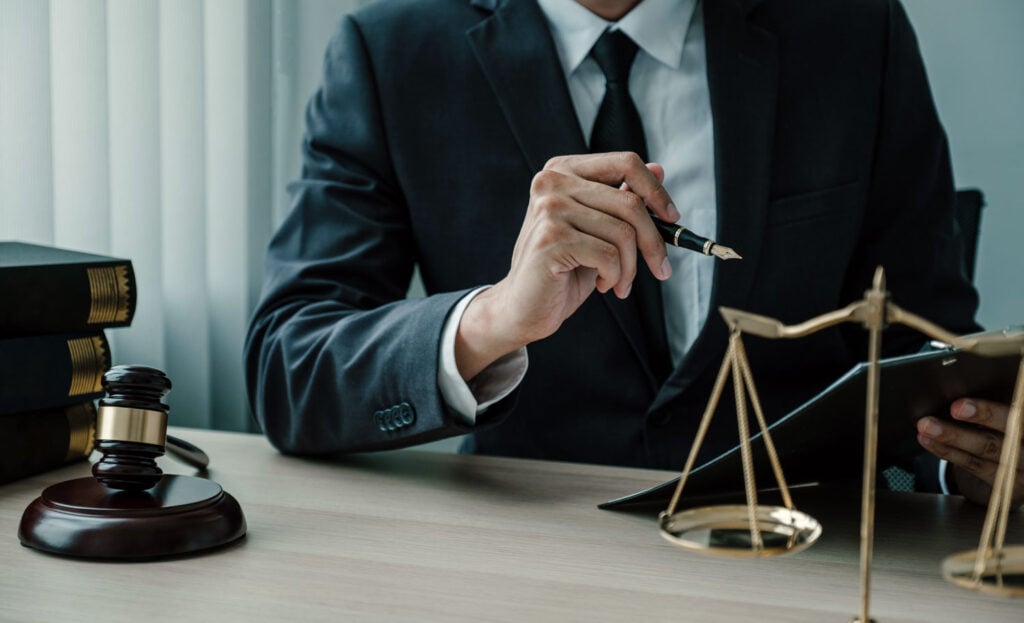
Global Law Experts
Lawyers
Countries Covered
Practice Areas
Discover independent Criminal Liability legal experts recognized by Global Law Experts. Explore award-winning attorneys worldwide.




No results available Reset filters?
posted 8 months ago
No results available Reset filters?
Criminal liability defines the legal responsibility of an entity or individual for acts that violate statutory laws. This practice focuses on the intersection of Actus Reus (the guilty act) and Mens Rea (the guilty mind). Attorneys provide the framework for determining Corporate Liability, where an organization is held responsible for the actions of its agents, and identifying defenses like Necessity, Duress, or Lack of Intent.
Global Law Experts connects you with specialists who possess the forensic depth required to assess Strict Liability offenses and Regulatory Non-compliance. These practitioners handle Internal Investigations, navigate the legalities of Vicarious Liability, and advise on the mitigation of “Culpability Scores” under sentencing guidelines. They provide the strategic insight needed to manage exposure and protect reputations in any legal forum.
Every GLE member is independently vetted by practice area and jurisdiction.
To secure a conviction, a prosecutor typically must prove two main elements beyond a reasonable doubt: Actus Reus (the guilty act) and Mens Rea (the guilty mind). “Actus Reus” refers to the physical action of the crime, such as pulling a trigger or stealing a wallet. “Mens Rea” refers to the defendant’s mental state at the time, proving they acted intentionally, knowingly, recklessly, or negligently. If a person committed the act (like hitting someone) but lacked the mental intent (because it was a pure reflex or accident), criminal liability generally cannot be established.
Yes, under the doctrine of Respondeat Superior (let the master answer), a corporation can be prosecuted for crimes committed by its employees if the acts were done within the scope of their employment and intended, at least in part, to benefit the corporation. This means if a sales manager bribes a foreign official to win a contract for the company, the company itself can be indicted, fined millions of dollars, and subject to federal monitoring, even if the CEO didn’t know about the specific bribe.
Vicarious liability allows a person (or company) to be held criminally responsible for the actions of another, even if they didn’t personally commit the crime. While this is rare in criminal law compared to civil law, it often applies in regulatory or business contexts. For example, a bar owner can be held criminally liable if their bartender serves alcohol to a minor, even if the owner wasn’t in the building at the time. The law imposes this to ensure business owners enforce strict compliance with safety and public welfare regulations.
Strict liability crimes (like statutory rape or speeding) do not require the prosecutor to prove “Mens Rea” (intent); doing the act is enough to be guilty. Since a lawyer cannot argue “I didn’t mean to,” defense strategies focus on factual innocence or procedural errors. For example, in a speeding case, the lawyer won’t argue you were in a rush (intent doesn’t matter); instead, they will attack the accuracy of the radar gun’s calibration (the act didn’t happen as alleged) or prove that the officer lacked probable cause for the traffic stop.
Generally, yes, due to the legal maxim “Ignorantia juris non excusat” (ignorance of the law is no excuse). You can be convicted even if you honestly believed your actions were legal. However, there are rare exceptions for “Specific Intent” crimes where the government must prove you intended to violate a known legal duty (common in complex tax fraud cases), or “Mistake of Fact,” where a misunderstanding of the situation (like taking a coat you thought was yours) negates the intent to steal.
Yes, you can be charged with the full crime just for helping. Under accomplice liability laws, anyone who aids, abets, encourages, or assists in the commission of a crime can be prosecuted as a “Principal,” facing the exact same sentence as the person who actually pulled the trigger or robbed the bank. This includes the “getaway driver” or the person who bought the tools for a burglary; if you knowingly contributed to the success of the crime, the law treats you as if you committed the act yourself.
The Insanity Defense is a complete defense that argues the defendant was so mentally ill at the time of the crime that they could not understand the nature of their actions or distinguish right from wrong (often based on the M’Naghten Rule). If successful, the defendant is found “not guilty by reason of insanity” and usually committed to a psychiatric hospital rather than prison. Diminished Capacity, by contrast, is a partial defense; it admits the act happened but argues the defendant’s mental state prevented them from forming the specific intent required for a harsh charge (e.g., reducing a charge from First-Degree Murder to Manslaughter).
Absolutely, as RICO (Racketeer Influenced and Corrupt Organizations Act) charges are among the most complex and dangerous in criminal law. Originally designed for the Mafia, prosecutors now use it against businesses and gangs to charge leaders for crimes ordered by them but committed by underlings. A lawyer defends against this by attacking the “pattern of racketeering activity” requirement, arguing that the alleged crimes were isolated incidents rather than a coordinated criminal enterprise, effectively dismantling the link that ties the leader to the street-level crimes.
To secure a conviction, a prosecutor typically must prove two main elements beyond a reasonable doubt: Actus Reus (the guilty act) and Mens Rea (the guilty mind). "Actus Reus" refers to the physical action of the crime, such as pulling a trigger or stealing a wallet. "Mens Rea" refers to the defendant's mental state at the time, proving they acted intentionally, knowingly, recklessly, or negligently. If a person committed the act (like hitting someone) but lacked the mental intent (because it was a pure reflex or accident), criminal liability generally cannot be established.
Yes, under the doctrine of Respondeat Superior (let the master answer), a corporation can be prosecuted for crimes committed by its employees if the acts were done within the scope of their employment and intended, at least in part, to benefit the corporation. This means if a sales manager bribes a foreign official to win a contract for the company, the company itself can be indicted, fined millions of dollars, and subject to federal monitoring, even if the CEO didn't know about the specific bribe.
Vicarious liability allows a person (or company) to be held criminally responsible for the actions of another, even if they didn't personally commit the crime. While this is rare in criminal law compared to civil law, it often applies in regulatory or business contexts. For example, a bar owner can be held criminally liable if their bartender serves alcohol to a minor, even if the owner wasn't in the building at the time. The law imposes this to ensure business owners enforce strict compliance with safety and public welfare regulations.
Strict liability crimes (like statutory rape or speeding) do not require the prosecutor to prove "Mens Rea" (intent); doing the act is enough to be guilty. Since a lawyer cannot argue "I didn't mean to," defense strategies focus on factual innocence or procedural errors. For example, in a speeding case, the lawyer won't argue you were in a rush (intent doesn't matter); instead, they will attack the accuracy of the radar gun's calibration (the act didn't happen as alleged) or prove that the officer lacked probable cause for the traffic stop.
Generally, yes, due to the legal maxim "Ignorantia juris non excusat" (ignorance of the law is no excuse). You can be convicted even if you honestly believed your actions were legal. However, there are rare exceptions for "Specific Intent" crimes where the government must prove you intended to violate a known legal duty (common in complex tax fraud cases), or "Mistake of Fact," where a misunderstanding of the situation (like taking a coat you thought was yours) negates the intent to steal.
Yes, you can be charged with the full crime just for helping. Under accomplice liability laws, anyone who aids, abets, encourages, or assists in the commission of a crime can be prosecuted as a "Principal," facing the exact same sentence as the person who actually pulled the trigger or robbed the bank. This includes the "getaway driver" or the person who bought the tools for a burglary; if you knowingly contributed to the success of the crime, the law treats you as if you committed the act yourself.
The Insanity Defense is a complete defense that argues the defendant was so mentally ill at the time of the crime that they could not understand the nature of their actions or distinguish right from wrong (often based on the M'Naghten Rule). If successful, the defendant is found "not guilty by reason of insanity" and usually committed to a psychiatric hospital rather than prison. Diminished Capacity, by contrast, is a partial defense; it admits the act happened but argues the defendant's mental state prevented them from forming the specific intent required for a harsh charge (e.g., reducing a charge from First-Degree Murder to Manslaughter).
Absolutely, as RICO (Racketeer Influenced and Corrupt Organizations Act) charges are among the most complex and dangerous in criminal law. Originally designed for the Mafia, prosecutors now use it against businesses and gangs to charge leaders for crimes ordered by them but committed by underlings. A lawyer defends against this by attacking the "pattern of racketeering activity" requirement, arguing that the alleged crimes were isolated incidents rather than a coordinated criminal enterprise, effectively dismantling the link that ties the leader to the street-level crimes.
Global Law Experts is dedicated to providing exceptional legal services to clients around the world. With a vast network of highly skilled and experienced lawyers, we are committed to delivering innovative and tailored solutions to meet the diverse needs of our clients in various jurisdictions.

Thinking of buying property in Brazil? Start with a full legal safety net.
✔️ Check title and ownership history
✔️ Verify no debts or disputes
✔️ Confirm zoning and permits.
#BrazilProperty #RealEstateInvesting #LegalDueDiligence #ForeignInvestment #PropertyLaw #GlobalRealEstate #InvestmentRisk #BrazilLaw

When your international business faces financial distress, quick action is key! 🔑 Negotiating with creditors, restructuring debt, and understanding insolvency laws can help regain stability. Global Law Experts is here to guide you through your options.
🌍Explore the details on our website.
🔗Link in bio
#GlobalLawExperts #CommercialLaw #BusinessLaw #LegalAdvice #BusinessGrowth #LegalTips #BusinessStrategy #LegalCompliance #Law #LegalKnowledge #LegalAwareness #Law101 #LegalEducation #IntellectualProperty

Thinking of buying property in Brazil? Don’t stop at the contract or key handover. Make sure the title is officially registered before calling it yours.
#BrazilRealEstate #PropertyLaw #GlobalInvestment #ForeignInvestors #LegalTips #DueDiligence #RealEstateRegistration #SecureInvestment

Getting a termination notice right now? Know your rights. Valid reason, fair process, proper notice they matter. Don’t let a bad dismissal walk away without accountability.
#EmploymentLaw #WorkerRights #Termination #LaborLaw #FairDismissal #WorkplaceJustice #LegalAwareness #GlobalWorkforce

Running a business is hard enough — lawsuits shouldn’t make it harder. 🚫 Protect your business with the right legal strategies and expert tools from Global Law Experts. Let’s secure your future together! 💼
🌍Explore the details on our website.
➡️www.globallawexperts.com
#GlobalLawExperts #CommercialLaw #BusinessLaw #LegalAdvice #BusinessGrowth #LegalTips #BusinessStrategy #LegalCompliance #Law #LegalKnowledge #LegalAwareness #Law101 #LegalEducation #IntellectualProperty #Infringed #Ecommerce #LegalBranding
Global Law Experts is dedicated to providing exceptional legal services to clients around the world. With a vast network of highly skilled and experienced lawyers, we are committed to delivering innovative and tailored solutions to meet the diverse needs of our clients in various jurisdictions.

Thinking of buying property in Brazil? Start with a full legal safety net.
✔️ Check title and ownership history
✔️ Verify no debts or disputes
✔️ Confirm zoning and permits.
#BrazilProperty #RealEstateInvesting #LegalDueDiligence #ForeignInvestment #PropertyLaw #GlobalRealEstate #InvestmentRisk #BrazilLaw

When your international business faces financial distress, quick action is key! 🔑 Negotiating with creditors, restructuring debt, and understanding insolvency laws can help regain stability. Global Law Experts is here to guide you through your options.
🌍Explore the details on our website.
🔗Link in bio
#GlobalLawExperts #CommercialLaw #BusinessLaw #LegalAdvice #BusinessGrowth #LegalTips #BusinessStrategy #LegalCompliance #Law #LegalKnowledge #LegalAwareness #Law101 #LegalEducation #IntellectualProperty

Thinking of buying property in Brazil? Don’t stop at the contract or key handover. Make sure the title is officially registered before calling it yours.
#BrazilRealEstate #PropertyLaw #GlobalInvestment #ForeignInvestors #LegalTips #DueDiligence #RealEstateRegistration #SecureInvestment

Getting a termination notice right now? Know your rights. Valid reason, fair process, proper notice they matter. Don’t let a bad dismissal walk away without accountability.
#EmploymentLaw #WorkerRights #Termination #LaborLaw #FairDismissal #WorkplaceJustice #LegalAwareness #GlobalWorkforce

Running a business is hard enough — lawsuits shouldn’t make it harder. 🚫 Protect your business with the right legal strategies and expert tools from Global Law Experts. Let’s secure your future together! 💼
🌍Explore the details on our website.
➡️www.globallawexperts.com
#GlobalLawExperts #CommercialLaw #BusinessLaw #LegalAdvice #BusinessGrowth #LegalTips #BusinessStrategy #LegalCompliance #Law #LegalKnowledge #LegalAwareness #Law101 #LegalEducation #IntellectualProperty #Infringed #Ecommerce #LegalBranding

Send welcome message